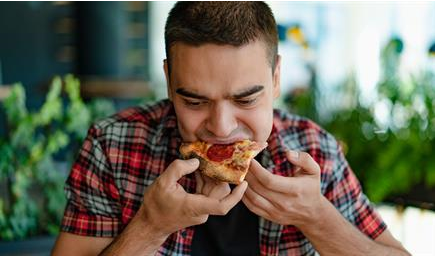Why do we turn to food when we’re not feeling so good? A long, tiring day, hearing upsetting news or having an argument – these everyday scenarios can bring out negative emotions which can lead to feeling listless or ‘empty’. Reaching for our favorite comfort foods is a common way of trying to fill this void, creating a false sense of feeling full or ‘whole’ again.
However, emotional eating can go beyond everyday stress, sadness and anger. Understanding why we turn to food for comfort, and recognizing the difference between real and emotional hunger is key to forming more positive eating habits.
What’s the difference between emotional and true hunger?
- Emotional hunger is instant and gives you an overwhelming urge to get up and eat. True hunger comes on gradually, and is easier to control or delay.
- Emotional hunger craves comfort food, whereas your true hunger will accept all food as good nourishment.
- Real hunger is satisfied when your stomach is full, while emotional hunger leads to mindless eating that can last for long.
- Emotional hunger can lead to guilt and regret. This is because unlike physical hunger, you know you’ve succumbed to a craving and given your body food you don’t necessarily need.
5 tips to control emotional eating
- Be mindful Asking yourself why you are eating, or if you really are hungry are some of the easiest and most effective ways to stop your urges before you open the refrigerator or take that bite. Questioning yourself can help you make more conscious decisions.
- Switch unhealthy snacks with healthier options One of the best ways to curb emotional eating is to cut off the supply. When the food you’re craving isn’t on hand, there’s less chance that you will gorge on chips and cookies. Instead, keep healthy snacks like fruit and nuts beside you to help you in your urges.
- Try other emotional management techniquesActivities that calm or distract your mind such as yoga, meditation or reading are great ways of addressing negative emotions. Even simple activities like going for walk or calling a good friend who you haven’t been in touch with for a while can help pick up your mood and discourage you from comfort eating.
- Start a food diary By noting down what you eat you will not only be able to calculate the amount you eat throughout the day, but also the quality of food and how often do you eat. Analyzing your food diary may also help you identify your strongest comfort eating triggers.
- Address the root cause Temporary issues such as a disagreement with a friend or a difficult time at work can lead you to comfort eat, however, chronic issues like long-term anger, depression and stress may well be the root cause of longer term emotional eating. Speaking to your doctor or seeking professional counseling can help you get your emotional eating pattern on the right track.





